Blurring all kinds of lines
Updated: 2011-12-10 07:12
By Elizabeth Kerr(HK Edition)
|
|||||||
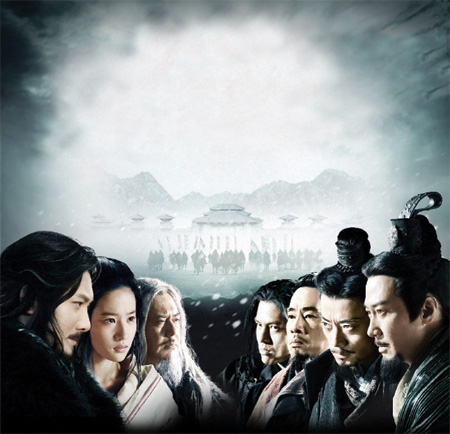
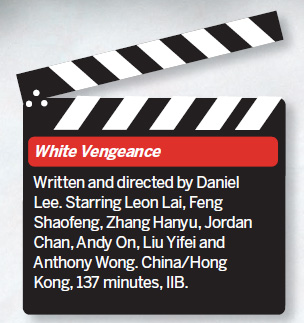
The busy holiday season means another Chinese historical epic. Elizabeth Kerr reports.
If there's one thing that Chinese cinema has proved time and again since the current boom began a few years ago, it is that there is no shortage of historical anecdotes and notable moments to draw upon for narrative inspiration, and that producers don't seem to tire of recreating them in epic dramas. As was the case with almost every historical epic to come from China in the last few years, great moments in military-dynastic history have proven to be the basis for box office bonanzas at Mainland cinemas and a source of constant employment or Hong Kong directors. More than one filmmaker has taken the role of hired gun recently to helm a massive, big budget extravaganza (Peter Chan with The Warlords, John Woo with Red Cliff as just two examples) and the trend won't stop until Chinese production companies are convinced they have the directors to handle their ambitious projects. Many would argue that these are simply co-productions, but scratch the surface and the content makes it clear that these are indeed Chinese films. That's neither good nor bad. It's just what it is. No matter how much money David Cronenberg got from American producers for Dead Ringers, that was a Canadian film. Trust me.
Making the leap into this arena now is Daniel Lee, a moderately successful local director that made a splash with Jet Li's silly, but enjoyable, actioner Black Mask back in 1996. Lee's work has been hit or miss since then, but started taking the epic route a few years back with Three Kingdoms: Resurrection of the Dragon and later 14 Blades. Neither was going to change the way audiences view the form, but Lee proved he could effectively wrangle multiple story threads, huge sets, complicated location shooting and the proverbial cast of thousands. His latest is White Vengeance, and if we're lucky Lee won't try this again any time soon.
Set during the dying days of the Qin Dynasty and based on the famous Banquet of Hongmen, White Vengeance focuses on generals Liu Bang (Leon Lai) and Xiang Yu (Feng Shaofeng) and their parallel rise to power and deteriorating relationship. Initially allies of a sort after getting over the fact that Xiang was supposed to assassinate Liu, both dedicated themselves to overthrowing the remaining Qin and conquering China for the Chu with the blessing of interim king Huai. Liu is totally behind Xiang's quest for total power, but he's talked into making his own play for the throne by his trusty band of henchmen. To do this, he must conquer the city of Xianyang and find the Qin seal. Feeling betrayed by the man he believed wanted nothing to do with ruling, Xiang organizes the banquet, a summit as it were, and this is where Xiang's plans begin their slow collapse. It's also where Lee totally loses control of his film.
Up to this point, White Vengeance was a serviceable, if pedestrian, historical drama about loyalty as collateral damage of unbridled ambition. What it turns into, essentially, is The Godfather Part II without any of the nuanced observances and delicately detailed performances. Xiang and Liu's trusted advisors, Fan Zeng (Anthony Wong, doing a lot of squinting) and Zhang Liang (Zhang Hanyu) square off in a drawn out weiqi match that's supposed to mirror the path Xiang and Liu have set out on. All it does, however, is drag on endlessly and increasingly nonsensically in a bid to be The Big Moment. It's supposed to be intense but it frequently flirts with the comical. From this point on Lee take a severe detour from actual history and allows dramatic license to run amok.
There are a host of issues and ideas that could have provided a foundation for valid and resonant storytelling: Liu is a peasant class soldier who rose through the ranks and (in reality) would be the first Han emperor. What drove him? How did (this version of) Liu come to be so easily swayed by his sycophants? Is losing what he has gained the hard way at the root of his paranoia? Did he ever believe any of the things he professed? Conversely, Xiang is the child of privilege. Is he simply an entitled brat who wants to play king? Is he really as dangerous as Liu's advisors lead us to believe? If he just wants what is best for China, why does he seem personally offended by Liu's ambition? Who knows? Lee can't be bothered to explore any of it, and so by the time Lai goes all Michael Corleone on everyone in a brutal climax, we don't care anymore.
White Vengeance is the kind of film that demands a lot of its performers, and the only actor here to really step up to the plate is Zhang (Bodyguards and Assassins, Assembly). Zhang manages to make Zhang Liang visibly torn between doing what's right and doing what's safe, and without him the film would be even less connective than it already is. Wong looks bored at best and the rest of the supporting cast - Andy On as the motivated Han Xin and Jordan Chan (!) as the devoted Fan Kuai - barely register as characters, so little to work with are they given. Liu Yifei as Xiang's love interest Yuji is hilariously underwritten and does about as much for Xiang's character as a houseplant. There are early hints that a love triangle could be at play, but Lee drops the idea and never revisits it. For once, for possibly the first time ever, I wished there was a woman to come between two warriors. At least that would have provided some insight into who they were, however weak.
Despite some dodgy CGI and a breakdown in the detailing that give modern movie images their richness and depth, White Vengeance at least looks great in close-up. The sets are evocative and the costumes (and the hair. Oh, the hair!) are impeccable. It's not the worst film of its ilk by any means, but when your peer group is Assembly and Wu Xia, "not the worst" is the kiss of death.
White Vengeance opened in Hong Kong on Thursday.
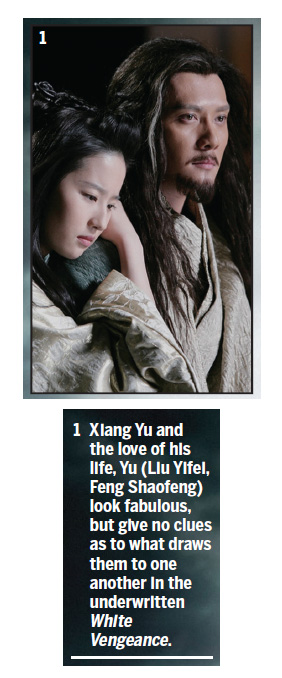
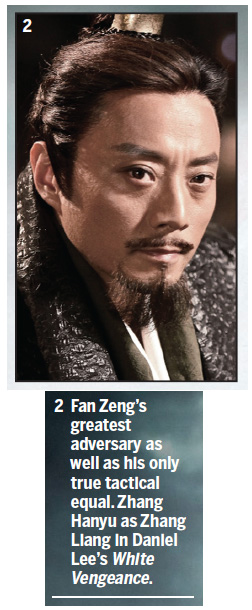
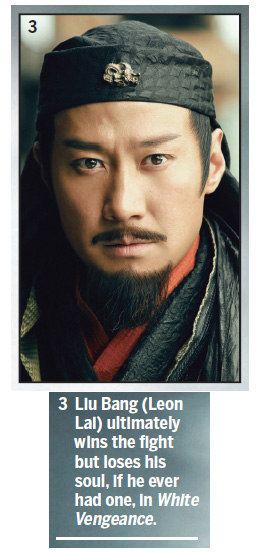
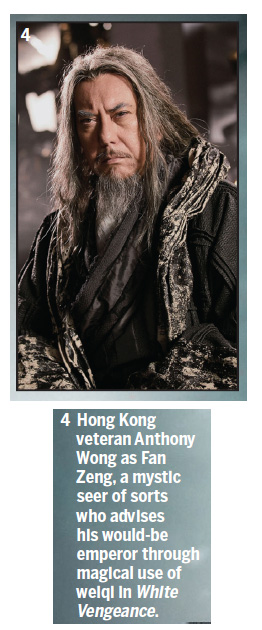
(HK Edition 12/10/2011 page4)